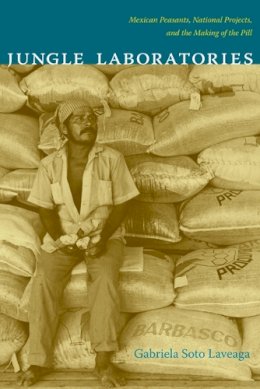Gabriela Soto Laveaga is Professor of the History of Science at Harvard University.
“[T]his is an interesting and important book. For Mexicanists, it makes a much-needed contribution to studies of post-1940 rural Mexico and of EcheverrÍa’s era in particular. It will earn attention from regional scholars interested in the history of science and the history of state formation, political organization, and transnational business, in addition to a commodity studies audience. Finally, historians, anthropologists, and geographers interested in the ebb and flow of local knowledge will also find much use in this careful study.” - Emily Wakild, Hispanic American Historical Review “Based on archival sources and more than fifty interviews with former barbasco pickers, processing plant owners and state officials, Jungle Laboratories yields fascinating insights into the social, political and economic consequences of the global search for medicinal plants at a local level within the rural regions of southeast and southwest Mexico. . . . Soto Laveaga’s book is a powerful reminder of the complex local and international relationships involved in the production of medicinal drugs and the intricate social, economic and political impact this can have on individuals’ lives.” - Lara Marks, Medical History “Soto Laveaga has produced an important work on the political economy of barbasco that brings to the fore a little-known chapter in the creation of the contraceptive pill and analyses the way in which scientific issues go beyond metropolitan academic scientific communities and filter down to apparently remote pockets of rural societies engaged in the exportation of primary products. This splendid work suggests that social Latin American historians can make a significant contribution to understanding the recent political development of medicinal plants and human reproductive programmes. “ - Marcos Cueto, Journal of Latin American Studies In this thoroughly researched and rewarding interdisciplinary book, Gabriela Soto Laveaga examines the social, local, and international consequences of the global search for medicinal plants between the 1940s and the late 1980s. . . . This work is an important contribution to the history of science, state formation, post-1940s Mexico, and to the study of EchevarrÍa’s presidency.” - CLAUDIA AGOSTONI, American Historical Review “[A]nyone would be moved by the campesiÑo stories Soto Laveaga ably sows through her book and harvests at its conclusion. . . . Soto Laveaga’s sympathetic but entirely unpatronizing inclusion of campesiÑo voices validates her claim that battles over the knowledge of barbasco briefly transformed some worker identities, though many today are still unsure why anyone wanted what to them was little more than a weed.” - Andrew Benedict-Nelson, Times Literary Supplement “In this innovative and compelling book, Gabriela Soto Laveaga links together a host of phenomena crying out for attachment. Jungle Laboratories brings bioprospecting into conversation with Mexican nationalism; makes pharmaceutical development connect with campesinos striving for recognition as citizens and experts; locates the conjunction of contemporary bioscience and Latin American modernity; and finds the overgrown intersection of steroids and magical thinking-thereby giving us a ground-breaking postcolonial study of the roots of global biomedicine.”-Warwick Anderson, author of Colonial Pathologies: American Tropical Medicine, Race, and Hygiene in the Philippines “[A]nyone would be moved by the campesiÑo stories Soto Laveaga ably sows through her book and harvests at its conclusion. . . . Soto Laveaga’s sympathetic but entirely unpatronizing inclusion of campesiÑo voices validates her claim that battles over the knowledge of barbasco briefly transformed some worker identities, though many today are still unsure why anyone wanted what to them was little more than a weed.” - Andrew Benedict-Nelson (TLS) “[T]his is an interesting and important book. For Mexicanists, it makes a much-needed contribution to studies of post-1940 rural Mexico and of EcheverrÍa’s era in particular. It will earn attention from regional scholars interested in the history of science and the history of state formation, political organization, and transnational business, in addition to a commodity studies audience. Finally, historians, anthropologists, and geographers interested in the ebb and flow of local knowledge will also find much use in this careful study.” - Emily Wakild (Hispanic American Historical Review) “Based on archival sources and more than fifty interviews with former barbasco pickers, processing plant owners and state officials, Jungle Laboratories yields fascinating insights into the social, political and economic consequences of the global search for medicinal plants at a local level within the rural regions of southeast and southwest Mexico. . . . Soto Laveaga’s book is a powerful reminder of the complex local and international relationships involved in the production of medicinal drugs and the intricate social, economic and political impact this can have on individuals’ lives.” - Lara Marks (Medical History) “Soto Laveaga has produced an important work on the political economy of barbasco that brings to the fore a little-known chapter in the creation of the contraceptive pill and analyses the way in which scientific issues go beyond metropolitan academic scientific communities and filter down to apparently remote pockets of rural societies engaged in the exportation of primary products. This splendid work suggests that social Latin American historians can make a significant contribution to understanding the recent political development of medicinal plants and human reproductive programmes. “ - Marcos Cueto (Journal of Latin American Studies) In this thoroughly researched and rewarding interdisciplinary book, Gabriela Soto Laveaga examines the social, local, and international consequences of the global search for medicinal plants between the 1940s and the late 1980s. . . . This work is an important contribution to the history of science, state formation, post-1940s Mexico, and to the study of EchevarrÍa’s presidency.” - CLAUDIA AGOSTONI (American Historical Review)

